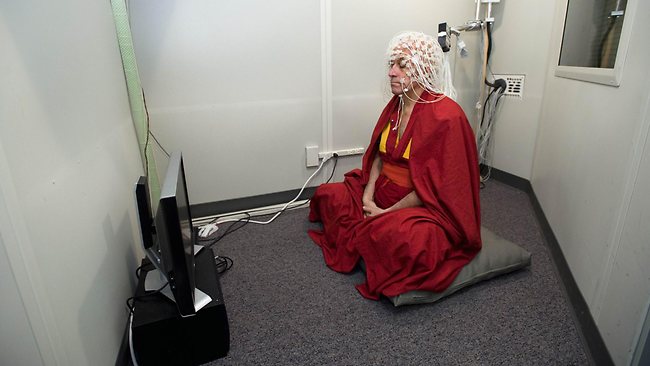Your brain on meditation
“Challenge accepted”
At age 19 I had already lived in Thailand for 2 years. During my first year of university I was paired with a wonderful roommate who introduced me to some Buddhist principles and had told me she’d gone to several meditation retreats including a 10-day silent meditation retreat in the province of Surat Thani. As it turned out, Suan Mokkh was one of the few that offered an English-speaking retreat. And so, as one odd 19 year-old I hopped on a train that following summer to Suan Mokkh. During my entry interview, I don’t think I impressed the monk asking me what I was doing here by answering that I saw this retreat as “a challenge”. He laughed, said I was the youngest person there and with a smile said young people “always love a challenge”. Then his face changed and with a more serious tone told me that he didn’t want to see me quit halfway through. And so I thought “challenge accepted”.
How to meditate
The 4th day was rough, after the novelty and excitement of the first few days, I found myself having more and more trouble meditating, I was restless. At that time I thought meditating was shooing away thoughts, without acknowledging them at all, just brushing them off as soon as they crept in. Surprisingly, what I thought would be difficult did not turn out to be that we were sleeping on wooden panels and a wooden pillow, or that we would have to wake up at 4.30am, or that we would only eat twice a day (monks only once daily). My mind was not at peace, I started having nightmares, and began to wonder… why do people meditate?! Only years later did I understand how to meditate and that a big part of meditation was to acknowledge our current state of mind and the thoughts, from there you start to let go of your thoughts as they come and go. I did complete the retreat, what the monk had told me gave me a purpose on difficult days, and I hope to return to Suan Mokkh with what I know now.
Why meditate?
After all this, I still wondered why should we meditate? As a researcher, I wanted to know what effects were attributed to meditation? Practioners of yoga or meditation will tell you that meditating is beneficial for many reasons, but… what does science tell us? When I first looked into peer-reviewed articles I was not expecting so much variety in terms of the meditation being used, the setting, the participants, the research design. And it seemed like all my questions about meditation had been researched already. From reading about brain imaging studies to wellness studies, here’s what I found on the biological evidence, neuropsychological tests, and emotional wellbeing.
Mindfulness and meditation, what’s the difference?
First things first, I will be mentioning meditation and mindfulness, but what’s the difference you may ask? Meditation includes a variety of techniques to achieve a heightened state of consciousness, to acknowledge the fluctuations of the mind and self-regulate them. Mindfulness is being aware of bodily sensations of stress and of reaction patterns in a non-judgemental manner. For example, you’ve most likely attended a class here at Luna (if not, get in here!) or elsewhere where the teacher asked you to focus on your breath. That would be doing a mindful meditation on the breath.
Studying the brains of meditators
When I looked for evidence I first stumble upon a talk by Rohan Dixit, one of the first scientists to mediatize the fact that meditation has an effect on the brain. Thanks to cooperative monks in northern India, Dharam Sala and Ladakh, Rohan is researching long-time meditators and linking meditation with specific brain patterns. Many other research teams have looked at the effects of meditation on the brain using meditators as subjects, such as Mathieu Ricard pictured below. Mainly, research has focused on a very interesting brain region called the insula, located in the depth of the center of the cerebrum (brain), is involved in attention, salience, and self-awareness. Several articles have pointed to the involvement of the insula in “top-down” attention; paying attention on purpose, and “bottom-up” attention; attention elicited by the environment. In addition, this region seems to be in-between sensory reception and executive function. Researchers have described it as a switch button; from not engaging with the environment to paying attention to a specific stimulus. And guess what? Meditation has been linked to better top-down attention, and executive control. In fact, a review of 78 brain imaging studies has shown that the insula and other brain regions such as the amygdala associated with cognitive control and self-regulation have different activation patterns in meditators vs non-meditators.
Back to you
So what can we take in from that, surely we can’t know for sure how and if our individual brains are affected by the fact that we mediate. However, research does suggest that certain regions are associated with meditation which means that overall meditation seems to activate certain regions of the brain that are associated with cognitive control. But how does this translate into your meditation practice? Studies have shown better execution of certain psychological tasks - or neuropsychological tests if you want to be fancy – in meditators from the Stroop Tasks which involves impulse control and attention. And this might be an effect that you have noticed after meditating or after a yoga class savasana. Are you better at focusing on specific things in the present moment, do you have less thoughts interfering with what you are doing at the time? Do you feel like you make better decisions?
Up next… what does research suggest about mindfulness and happiness?
About me
Hi! I’m Lea, a fervent student of neurosciences, mental health research, and a yogi since 2008! After completing my bachelors in biomedical sciences in Thailand, I came to Montreal to do a masters studying mechanisms of depression… and now I’m studying some more as a doctoral student in Psychiatry at McGill University. I’m still devoted to the study of depression, some might say it is a gloomy subject, but it being quite prevalent in the world and highly complex, I find it to be a fascinating topic! On occasion the week day scientist in me meets the weekend yogi in me and they wonder about topics like this one, why meditate? I hope you enjoy this blog post, and leave your comments below or come to my class Saturdays 9.30am!





